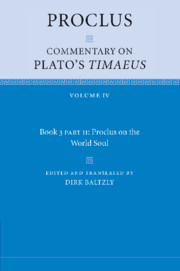I - The Relation Between the World Soul and its Body
Published online by Cambridge University Press: 30 June 2022
Summary
In the middle of it he placed Soul, extending it throughout the universe and then covering the body externally with it. (34b3–4)
The order of Plato's treatment of the question
God brings forth all things all at once (athroôs) and throughout eternity. For it is through his very being and through his eternal thinking of wholes that he engenders all the things that result from him – the totality of things both hypercosmic and encosmic: intellects, souls, natures, bodies and matter itself. If you ask me, demiurgic creation exhibits this ‘all at once’ aspect more than the Sun's illumination does. In the latter case, the entire light (to holon phôs) proceeds simultaneously from the Sun. But even though the Sun imitates the Father through visible (emphanês) creation, this is clearly inferior to the Father's eternal and invisible (aphanês) production. Therefore, as we said, though all things have come about from the act of creation eternally and all together (homou), nonetheless (homôs) the order of effects is still preserved; for all things proceed all together and each with its own order since there was present in that which produced it an eternal intelligence and an order prior to the things that have been ordered. Hence, even if all things result at once from one thing, nonetheless some of them are of primary worth while others have a lesser value. Some have proceeded to a greater, others to a lesser degree. Some have been joined together by the Demiurge through unification (kath’ henôsin), others through connection (kata synaphên), and still others through participation (kata methexin). So intellect is capable of being connate with intellect through unification. But soul naturally is able to be connected to intellect, while body is only able to participate; for example, even those things at the far end of the earth share in the radiance of the Sun.
Among all the things in the cosmos – intellect, soul and body – although it is the case that all of them have proceeded all at once, there nonetheless exists among these things the order which comes down from the Demiurge, and for this reason [Timaeus’] account at one time starts from above in the mode of procession and ends at the limit of creation,
- Type
- Chapter
- Information
- Proclus: Commentary on Plato's Timaeus , pp. 57 - 77Publisher: Cambridge University PressPrint publication year: 2009

